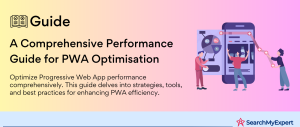Progressive Web App for E-commerce: Revolutionizing Online Shopping
In the ever-evolving digital landscape, e-commerce platforms constantly seek innovative ways to enhance user experience and drive sales. Enter Progressive Web Apps (PWAs), a game-changer in the realm of online shopping. This introduction will unravel the concept of PWAs, their distinctive features, and how they bridge the gap between traditional mobile websites and native apps, specifically in the context of e-commerce.
Understanding Progressive Web Apps (PWAs)
Progressive Web Apps are a hybrid of regular web pages and a mobile application. They bring together the best of both worlds: the wide reach of the web and the rich experience of a native application. Here’s what makes them stand out:
- Responsiveness:
PWAs are designed to work on any device with a single codebase, ensuring a seamless experience whether on a desktop, tablet, or smartphone. - Connectivity Independence:
They operate efficiently even in low-quality networks or offline, thanks to service workers. - App-like Interface:
PWAs mimic the feel and navigation of a native app, offering an immersive user experience. - Push Notifications:
Engaging customers through timely notifications, similar to native apps. - Safety: Deployed via HTTPS, PWAs ensure secure data transmission.
- Discoverability: Being a part of the web, they are easily discoverable through search engines, unlike native apps that require installation through an app store.
- Easy Installation & Updates:
PWAs can be added to a device’s home screen without the hassle of a traditional app store download, and updates are seamless and automatic.
The Limitations of Traditional Mobile Websites and Native Apps
Traditional mobile websites and native apps each have their drawbacks:
- Mobile Websites:
Often lack the advanced features and fluid user experience of native apps. They’re also typically slower and less engaging. - Native Apps:
Require downloads and regular updates, which can be a barrier for users. They also tend to be more costly and time-consuming to develop and maintain.
The E-Commerce Angle: Why PWAs?
For e-commerce platforms, PWAs present an enticing solution, blending the accessibility of web browsers with the robust capabilities of native apps. They offer:
- Enhanced User Engagement:
Through an app-like experience and push notifications, PWAs keep users engaged and informed. - Improved Performance: Faster load times and offline capabilities mean a smoother shopping experience, reducing bounce rates.
- Cost-Effectiveness:
PWAs eliminate the need for separate iOS and Android apps, reducing development and maintenance costs. - Higher Conversion Rates:
The seamless, fast, and engaging nature of PWAs can lead to increased conversion rates for e-commerce platforms.
Progressive Web Apps stand at the forefront of e-commerce innovation, promising a more efficient, engaging, and cost-effective online shopping experience. As we delve deeper into this topic, we’ll explore how PWAs are transforming the e-commerce landscape, one click at a time.
Advantages of PWAs for E-commerce
Progressive Web Apps (PWAs) are rapidly reshaping the e-commerce landscape. By offering a harmonious blend of web and app features, PWAs provide unique advantages that directly translate to improved performance, user experience, engagement, cost-efficiency, and SEO. Let’s dive into these benefits and how they revolutionize online shopping.
Improved Performance & Speed
- Faster Loading Times:
PWAs are engineered for speed. They utilize modern web capabilities to load content faster, even on slow networks. - Offline Access:
Service workers enable PWAs to function offline or on low-quality networks, ensuring continuous access to e-commerce platforms. - Minimal Data Usage: PWAs use less data compared to traditional websites or native apps, making them ideal for users with limited data plans.
Enhanced User Experience
- App-like Feel:
PWAs offer a full-screen experience with app-style interactions and navigation, making online shopping more intuitive and engaging. - Smoother Navigation:
With smooth animations and responsive design, PWAs provide a fluid browsing experience that keeps users engaged. - Home Screen Installation:
Users can add PWAs to their home screens, allowing for quick and easy access, just like native apps.
Increased Engagement & Conversion
- Push Notifications: PWAs can send push notifications, a powerful tool for re-engaging users and promoting offers, leading to higher click-through rates.
- Personalized Experiences:
Leveraging user data, PWAs can offer personalized shopping experiences, enhancing user satisfaction and loyalty. - Higher Conversion Rates:
The combined effect of improved performance, user experience, and engagement often leads to higher conversion rates in e-commerce.
Reduced Development & Maintenance Costs
- Single Codebase: PWAs require only one codebase for all platforms (iOS, Android, desktop), significantly reducing development and maintenance efforts.
- Easier Updates:
Updates to PWAs are simpler and faster as they don’t need to go through app store approvals, ensuring users always have the latest version.
Improved Search Engine Optimization (SEO)
- Cross-Device Accessibility:
Being responsive and accessible on all devices, PWAs are favored by search engines, improving their SEO ranking. - Faster Indexing:
The fast-loading pages of PWAs are more efficiently indexed by search engines, enhancing visibility and organic reach.
The benefits of PWAs for e-commerce are manifold. They offer a superior shopping experience with improved performance, engagement, and reduced costs, all while boosting SEO efforts. As these advantages become more widely recognized, PWAs are set to become a mainstay in the future of e-commerce.
Key Features of E-commerce PWAs
Progressive Web Apps (PWAs) are revolutionizing e-commerce with their unique blend of web and native app features. In this section, we’ll explore the key features of e-commerce PWAs that enhance both the user experience and business performance. These features not only cater to the demands of modern consumers but also empower businesses to thrive in a competitive digital marketplace.
Offline Browsing
- Seamless Access: PWAs allow users to browse product catalogs and access essential information even without an internet connection.
- Functionality: Key functionalities like viewing products, managing wishlists, and reading product reviews are available offline.
Push Notifications
- User Engagement:
PWAs utilize push notifications to keep users informed about new products, promotions, and updates. - Cart Reminders:
They can gently remind users about items left in their carts, nudging them toward the completion of their purchase.
Home Screen Installation
- Easy Access:
Users can add the PWA to their device’s home screen, ensuring quick and direct access to the e-commerce platform. - Brand Presence: This feature enhances brand visibility and fosters user loyalty by keeping the e-commerce site just a tap away.
Dynamic Content and Personalization
- Tailored Recommendations:
PWAs can offer personalized product suggestions based on user behavior and preferences, enhancing the shopping experience. - Targeted Offers:
Users receive offers and deals that are relevant to their interests and past shopping behavior.
Fast and Secure Checkout
- Streamlined Payments: PWAs provide a fast, intuitive, and secure checkout process, reducing cart abandonment.
- Trust and Reliability: Implementing advanced security measures, PWAs ensure safe transactions, thereby building trust among users.
The key features of e-commerce PWAs – offline browsing, push notifications, home screen installation, personalized content, and a secure checkout process – collectively work to create a more engaging, convenient, and safe shopping experience. As these technologies continue to evolve, e-commerce PWAs are poised to become an indispensable tool for online retailers.
Building a Successful E-commerce PWA
The successful implementation of a Progressive Web App (PWA) for e-commerce hinges on several critical factors. This section will outline the key steps involved in building an effective e-commerce PWA, focusing on platform selection, content optimization, feature implementation, security considerations, and performance enhancement.
Choosing the Right E-commerce Platform
- PWA Compatibility:
Ensure the chosen platform supports PWA development and its core features. - Feature-Rich: Look for platforms offering a range of functionalities that align with your e-commerce strategy.
Optimizing Content for Mobile Users
- High-Quality Images:
Use images that are visually appealing yet optimized for quick loading. - Concise Descriptions: Craft clear, concise product descriptions suitable for mobile screens.
- Responsive Design:
Ensure your PWA is responsive and provides a seamless experience across different devices.
Implementing Core PWA Features
- Offline Caching: Use service workers for offline functionality, allowing users to browse products even without an internet connection.
- Service Workers: Implement service workers for background tasks like push notifications and content updates.
- Push Notifications:
Engage users with timely and relevant notifications to boost sales and customer interaction.
Ensuring Security and Data Privacy
- Secure Payment Gateways:
Integrate trusted and secure payment methods to assure customers of safe transactions. - Data Encryption Protocols: Employ robust encryption protocols to protect user data and enhance trust.
Performance Optimization
- Code Optimization: Streamline your codebase for maximum efficiency and minimal loading time.
- Image Compression: Compress images without compromising quality to ensure fast page loads.
- Caching Strategies:
Utilize advanced caching mechanisms to speed up content delivery and improve user experience.
Building a successful e-commerce PWA involves careful consideration of platform selection, content optimization, feature implementation, security measures, and performance enhancement. By focusing on these key areas, businesses can develop a PWA that not only meets but exceeds the expectations of today’s online shoppers.
Case Studies with Real-life Examples and Their Success Stories
Progressive Web Apps (PWAs) have been a game-changer for many e-commerce businesses. In this section, we will explore real-life examples of successful e-commerce PWAs, focusing on their implementation strategies and the measurable benefits they have achieved. We’ll look at companies like Shopify, AliExpress, and Starbucks, which have leveraged the power of PWAs to enhance user engagement, boost conversion rates, and drive revenue growth.
Shopify’s PWA Success
- Implementation:
Shopify implemented a PWA to provide a faster, more reliable online shopping experience. - Benefits: The PWA resulted in quicker load times, improved user engagement, and higher conversion rates, contributing to Shopify’s exponential growth in the e-commerce sector.
AliExpress’s PWA Journey
- Strategy:
AliExpress transformed its mobile site into a PWA to offer a more app-like experience. - Results: This shift led to significant improvements in user engagement and doubled the conversion rates for new users, showcasing the potential of PWAs in global markets.
Starbucks’ PWA Revolution
- Approach: Starbucks created a PWA to provide an offline-first experience, allowing customers to browse the menu and customize orders, even without connectivity.
- Success:
The PWA increased daily active users, enhanced order frequency, and improved the overall customer experience, proving the effectiveness of PWAs in enhancing brand loyalty and revenue.
These case studies demonstrate the transformative impact of PWAs in the e-commerce industry. By embracing PWAs, these companies have not only enhanced user experience but also achieved tangible improvements in user engagement, conversion rates, and revenue, setting benchmarks for others in the industry.
Future of E-commerce PWAs
The realm of Progressive Web Apps (PWAs) in e-commerce is not just a fleeting trend, but a forward-moving wave, embracing cutting-edge technologies and innovations. In this segment, we delve into the emerging trends in PWA technology and assess the growing adoption of PWAs, envisioning their potential to revolutionize the online shopping experience.
Emerging Trends and Innovations in PWA Technology
- Augmented Reality (AR):
AR integration in PWAs is set to transform the shopping experience, allowing customers to visualize products in real-world settings. - Voice Commerce:
Voice-enabled shopping within PWAs offers a hands-free, convenient way for consumers to browse and purchase products. - Artificial Intelligence (AI) & Machine Learning (ML):
These technologies are enhancing PWAs by enabling personalized shopping experiences and intelligent product recommendations.
The Growing Adoption of PWAs
- Increased Acceptance:
The adoption of PWAs is on the rise as businesses recognize their potential to improve user experience and engagement. - Accessibility:
The ease of access without the need for app downloads is propelling the popularity of PWAs among users.
The Potential to Revolutionize Online Shopping
- Enhanced User Experience: With features like offline access, fast loading times, and app-like interfaces, PWAs are poised to elevate the standard of online shopping.
- Innovative Engagement: The integration of AR, voice commerce, and AI in PWAs will offer unique and engaging shopping experiences.
- Global Reach:
The lightweight and efficient nature of PWAs makes them ideal for reaching a wider, more diverse audience, including those in regions with limited internet connectivity.
The future of e-commerce PWAs is bright, marked by innovative integrations and a growing adoption rate. As these technologies continue to evolve, they promise to not only enhance the online shopping experience but also redefine the boundaries of digital commerce.
Key Takeaways and Advantages of PWAs for E-commerce
- Enhanced User Experience: PWAs provide a seamless, app-like experience, improving user engagement and satisfaction.
- Improved Performance: With faster loading times and offline capabilities, PWAs ensure a smooth and reliable shopping experience.
- Increased Engagement and Conversion: Features like push notifications and home screen installation drive user engagement and higher conversion rates.
- Cost-Efficient Development:
A single codebase for all platforms significantly reduces development and maintenance costs. - SEO Benefits: PWAs are more discoverable and indexable by search engines, enhancing online visibility.
- Innovative Features:
The integration of emerging technologies like AR and voice commerce sets PWAs apart, offering unique shopping experiences.
The Call to Action for Businesses
In the mobile-first era, where user preferences and behaviors are constantly evolving, adopting a PWA can be a game-changer for e-commerce businesses. It’s not just about keeping pace with technological advancements but about embracing a tool that can significantly enhance online presence, user experience, and overall business performance. Implementing a PWA is a forward-looking decision that can propel businesses to new heights in the competitive digital marketplace.
Conclusion
The exploration of Progressive Web Apps (PWAs) in the e-commerce domain reveals their profound impact on the digital marketplace. PWAs have emerged as a pivotal technology, blending the best of web and mobile app features to deliver enhanced performance, user engagement, and business efficiency. The key takeaways include their ability to provide an app-like experience, offline accessibility, increased conversion rates, cost-effective development, and improved SEO. Real-world success stories from Shopify, AliExpress, and Starbucks further underline the transformative potential of PWAs.
Innovate your web presence with Progressive Web App Service Firms.
Table of Contents
Toggle






